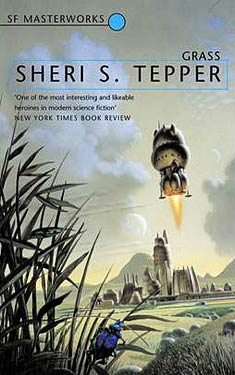I was first exposed to Sheri S. Tepper when I was searching for female science fiction authors. There was a bit of debate online about the quality of her writing. But after talking to some of the people I trust most, I have come to believe that while some of her work can be hit or miss, overall she is an asset to the science fiction genre.

 The first thing I noticed when I began the audio of Grass was how striking the language was. I have criticized science fiction writers for not being diligent enough in their writing process to really craft words together. Many times science fiction authors rely on the ideas of their work to drive the piece rather than the quality of their story telling. Tepper’s telling of Grass is definitely an exception to this. Grass was nominated for a Hugo for best novel in 1990 and was included in Millennium/Gollancz’s Masterwork collection. The novel opens with a vignette of the surface of a planet called Grass. It was sweeping an elegant. I was both excited and worried about these opening lines. They were beautiful, but if the rest of the book was written in such a manner I was afraid it would become bloated.
The first thing I noticed when I began the audio of Grass was how striking the language was. I have criticized science fiction writers for not being diligent enough in their writing process to really craft words together. Many times science fiction authors rely on the ideas of their work to drive the piece rather than the quality of their story telling. Tepper’s telling of Grass is definitely an exception to this. Grass was nominated for a Hugo for best novel in 1990 and was included in Millennium/Gollancz’s Masterwork collection. The novel opens with a vignette of the surface of a planet called Grass. It was sweeping an elegant. I was both excited and worried about these opening lines. They were beautiful, but if the rest of the book was written in such a manner I was afraid it would become bloated.
Grass!
Millions of square miles of it; numberless wind-whipped tsunamis of grass, a thousand sun-lulled caribbeans of grass, a hundred rippling oceans, every ripple a gleam of scarlet or amber, emerald or turquoise, multicolored as rainbows, the colors shivering over the prairies in stripes and blotches, the grasses—some high, some low, some feathered, some straight—making their own geography as they grow.
Through these words, the world of grass is painted before me. Especially through the audio narration I was able to feel like I was standing before the vast plains of multicolored grasses. Being overwhelmed by their splendor. I was also reminded of C. S. Lewis’s depiction of Malacandra on Out of The Silent Planet. I remember when I was reading it I fell so in love with the landscape of the planet. It was in a very similar way that I was drawn to Grass.
After my initial reaction to the description of Grass, I was soon drawn in by other interesting elements of the story. I was really intrigued by the politics of Grass and the whole galaxy. Now previous to meeting Mr. X, I would have considered myself apathetic to politics. But it ends up that I really love seeing the dynamic of interaction on a political level. The book starts out with the upper class population of Grass, called Bons, discussing what to do about some inquiries that are being made to further explore the planet. The people of Grass are very protective of their planet, their rituals, and their life. They moved to Grass to be free from many of the religious movements happening on Earth and across the human worlds. After much discuss that brought much of the dynamics to light, the elite citizens of Grass decide to allow a sort of ambassador to come previous to any sort of scientific or medical exploration team. But one of the particularly unique things is that this is only ONE of the many political dynamics in the book. All of which held equal interest to me, especially early on in the book.
Although many authority figures, especially on Earth, are denying its existence, there is a plague threatening to wipe out the whole of humanity planet by planet. Grass is of particular interest because it seems to be the only known planet that had not been afflicted by anything resembling the plague. A ambassador is sent with his family to Grass to subtly find out if it is true that no one on the planet has ever suffered from the plague. There is worry that somehow people on Grass have found a way to hide the results of a plague, as some other planets have been doing. But the evidence is very strong against this as there have even been rumors of people with the plague being magically healed after a visit to the port town on Grass.
 In an interview with Locus Magazine Tepper said:
In an interview with Locus Magazine Tepper said:
"I know I continually pound on the same themes, because they're things I care about deeply. Those are the soapboxes. But when the stories get too similar, begin to feel like the same book, that is when I am dissatisfied. I want to be sure it's something at least a little fresh and new, in approach or idea."It is through Tepper's passion that Majorie, the wife of the ambassador, is able to function in a political capacity on Grass. Majorie is a very smart woman who seems to understand the political dilemma even more than her husband. She is continually striving in her purpose on Grass to learn more about the people there and to discover if the plague is hiding somewhere uncover. Majorie is a very strong female character and it was refreshing to see her presence in the story. She also has the softness that can be lacking in a strong character. She is maternal, loyal, and extremely caring. It is interesting to see, that even considering this, the family dynamic that Tepper put her in.
Grass is a very long book and as it goes on more and more elements get weaved into the story. This is both a blessing and a curse. I love the way that Tepper explores so many different things through the different type of people who live on Grass, but it did get a little confusing, especially on audio. Although I would definitely recommend Grass to others I would dissuade them from listening to the audio version because the story was just a little too complex when you didn’t have the ability to glance back on previous sections. I think even if reading this book in paper the story had at least one too many elements for everything to connect together seamlessly.
Another interesting thing about Grass is that it is considered to be the first book in a series. The following stories are in the same world but not in a direct timeline with the first book. I think I would like to re-read Grass if I ever got the opportunity to purchase it and that I would also like to read the other books in this series.
What female science fiction writer would you recommend?
Great review. I haven't read this but I did notice a while back that besides Margaret Atwood's dystopian novels I haven't read any women sci-fi writers.
ReplyDeleteWow! I haven't read any of her books but this one looks like it needs to end up in my wish list / TBR. I'll take your advice to read instead of listen. I loved that description of the oceans of grass.
ReplyDeleteSounds like an interesting book. I've never read Tepper before--I'll have to look her up at the local library.
ReplyDeleteAs for recommendations, anyone interested at all in either space-opera or sci-fi dealing with genetic and biological sciences needs to read Lois McMaster Bujold. She's currently spending most of her time on her fantasy books, but her science fiction is still some of the best out there.
That SF Masterworks cover is the one I have! I was expecting Grass to be a winner for the book club 2011 selections, but it looks like I'll have to read it on my own here in the near future. I'm glad to see that you (mostly) liked Grass--and finished!
ReplyDeleteAs for female SF author recommendations, I highly recommend The Speed of Dark by Elizabeth Moon (which has very careful attention to the language and conveyance of character), The Left Hand of Darkness by Ursula K. Le Guin (an exploration of our views of gender and sexuality as a human is alone amongst a race of aliens that are neutrally gendered), Bitter Angels by C.L. Anderson (had a lot of problems, but overall has a really great story and interesting ideas), and Warchild by Karin Lowachee (a very easy read that's more space opera than science fiction, but written in an engaging and wonderful way). That's all the recommendations I can do off the top of my head right now! :)
It has been so long since read Grass that I had forgotten a lot of the plot until reading your summary. When I had first picked up Sheri Tepper's books I was excited and surprised by the quality of writing. I actually had to look up words that I didn't know the meanings to, and that hardly ever happened with other sci-fi books that I read. The combo of her writing and the issues that she deals with in conjunction with a sci-fi setting strikes just the right note with me. I should really re-read more of her books since it's been about a decade since I've read any of them.
ReplyDeleteMy other favorite sci-fi woman writer is Anne McCaffrey. Her style is different from Sheri Tepper's - easier to read and lighter in topic, but lots of fun.
I own a couple books by Tepper, but I haven't read them... Very slack of me!
ReplyDelete